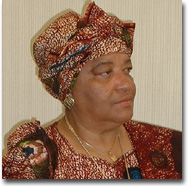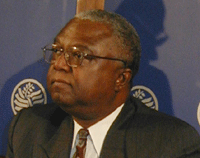LEGAP & GEMAP: Two Sides Of The
Dependency Syndrome
By Abdoulaye W. Dukulé
Adukule@theperspective.org
The Perspective
Atlanta, Georgia
July 25, 2005
|
|
The debate for or against LEGAP amongst Liberians has been mostly about “sovereignty” or “halting corruption,” the two major arguments used by both sides. As conceived by the international community, LEGAP was nothing short of a trusteeship. In a way, it was formalizing the status Liberia has lived under since 1990. Through LEGAP, the last space of sovereignty was taken away. With judges deciding legal cases, managers running government agencies and state enterprises, Liberia would have become a colony of a new type, taken over by a diffuse conglomerate of international actors accountable to nobody, with no one single country or organization ensuring that the actions of these new masters will be in the best interest of Liberia. As we wrote here at the start of the debate, we never expected LEGAP to become operational.
The Bryant administration was drawn into the debate and left with only the choice of producing its own version of the scheme, after going through a painful hara-kiri by admitting the existence of rampant corruption and mismanagement at all levels of government.
Bryant may think that he has accomplished something great by “upholding Liberia’s sovereignty” and tried to address the issue from a perspective that protects Liberia’s national interests. The problem, however, is that the current government has no authority to submit the nation to any governance system that goes beyond the transition. Its role and capacity were well defined by the CPA of Accra.
It is somehow ironic that while recognizing that this transitional government is engulfed in corruption, ineptitude and all sorts of managerial ills, the international community will seek to engage it in a scheme to salvage the nation?
The second problem is that the process seems to be kept secret, between Bryant’s inner circle and whomever they are dealing with in the “international community”, like in a shadow dance. Once the scheme was put on paper and presented, the response from the government should have been and must be, if ever called before the Security Council for signing ceremonies, that this short term government cannot negotiate such an important matter with its far reaching consequences.
Only an elected government, with a mandate from the electorate and the support of the majority of Liberians can enter a negotiation process with donor agencies in anything that can affect the future of the nation in the long-term. A scheme such as LEGAP should be open for discussions and Liberians should have the right to scrutinize every aspect of it before it is implemented. As the nation prepares for the first truly free and fair elections in her history, pushing something down the throat of a lame-duck “corrupt and inefficient” government is not the type of help that Liberia needs.
There is no doubt that after 25 years of mismanagement, Liberia will need all the help she can muster to get back on her feet. That help must however be based on what Liberians really need. For the past four decades, African nations have mostly been at the receiving end of fuzzy “development plans” concocted elsewhere without their input. LEGAP seems to be one of those new schemes, and where else but a “failed state” for a trial balloon? After Liberia, LEGAP could next find its way to Nigeria, Benin or Swaziland. The past 40 years of “aid” as conceived has not alleviated poverty and the new ideas for “poverty reduction” will not do any better than the “structural adjustments plans” of the 1980s. Somewhere between charity and paternalism, the goodwill is lost. Africa is poorer today than it was in 1960, notwithstanding the billions of dollars “wasted” in aid.
The next Liberian government will be in reality a transitional administration, with the responsibility of moving the nation from war to peace. The Bryant administration is a war government, composed as it is of elements of the three warring groups that destroyed the nation. The government coming out of the October 11, 2005 elections will have the capacity, the time and the mandate to conceptualize the kind of help Liberia needs and how she wants to go about getting that help after assessing the needs of the people. Liberians can then get together to formulate an agenda and decide what type of help they need and where to go find it.
 |
|
Ellen Johnson-Sirleaf
|
 |
|
Dr. Amos Sawyer
|
Those who support LEGAP believe that Liberians cannot build their own country and that only foreigners, through aid can put the nation on the right path. GEMAP is just the other side of that coin. It is also driven by the imperative of aid, where donors become more important actors in Liberia’s development. Aid, no matter how big, has never developed a nation and Liberia will not be developed by aid, unless that it is based on what Liberians think they need and it is channeled into programs they have agreed on.
During his last trip to the US, Chairman Bryant said that a donor country that had pledged to the reconstruction fund, sent students from a culinary school to cook for former combatants. Each of these “chefs” received daily the equivalent of the annual salary of a Liberian teacher. Who was benefiting from that aid, the former combatants who could have cooked their own rice and palm butter? The Liberian government who could have used the money to buy one more jeep or the donor country that sent away a dozen of its youth on a “tropical vacation”? That is not the type of aid Liberia needs.
There are many ways to help Liberia to address the needs of a war torn nation. Among the priorities, the US can use its leverage to write off Liberia’s debt right after elections. Another priority would be to encourage the resettlement of Liberian professionals – there are more Liberian doctors in Washington, DC area alone than in the whole of Liberia today – by providing budgetary support to the newly elected government. If a Liberian police officer were receiving the same pay as the UN police officer from Ireland, he would have no reason to be corrupt. The University of Liberia needs teachers and UNESCO could recruit Liberians professors that are now doing substitute teaching in America and provide them with decent salaries and they would go back home. Their salaries will help reconstruct Liberia.
From the University of Liberia or from Cuttington College, hundreds of Liberians went to attend the best schools in the world to earn graduate degrees and because of the debilitating conditions at home they were forced to stay abroad to make a living. Many among them are eager to return home. These Liberian professionals are not more corrupt than their American or British counterparts.
In conclusion, the transitional government does not have the political and moral authority to involve the nation in a long-term and far reaching agreement such as LEGAP/GEMAP. Liberians must decide the aid that they need once a government with a national mandate has been ushered into office. The views and interests of donor countries and agencies should not dictate aid to Liberia, which must be a response to the country’s needs.
LEGAP/GEMAP are but two sides of dependency syndrome. This young nation has had many false starts in her 158 years of existence. The last thing she needs is to serve as a guinea pig for some new fuzzy ‘international development scheme” that would push her further down the pit.
